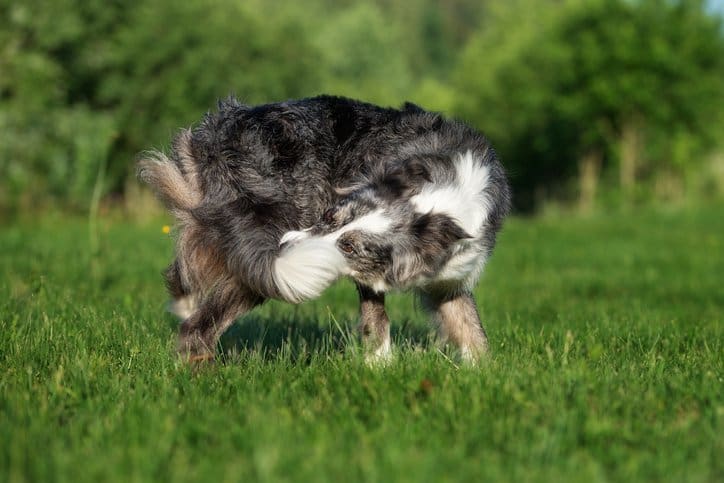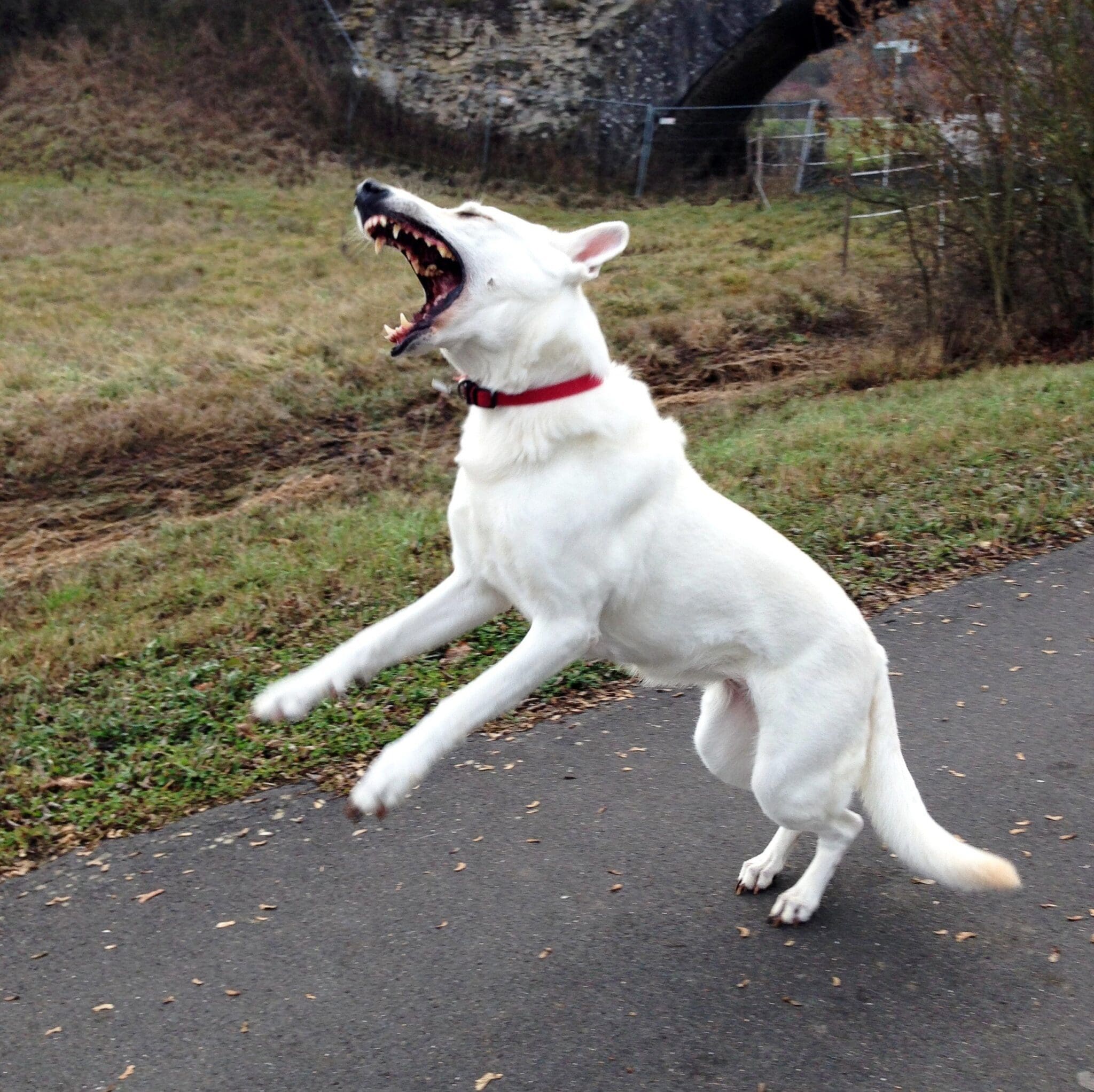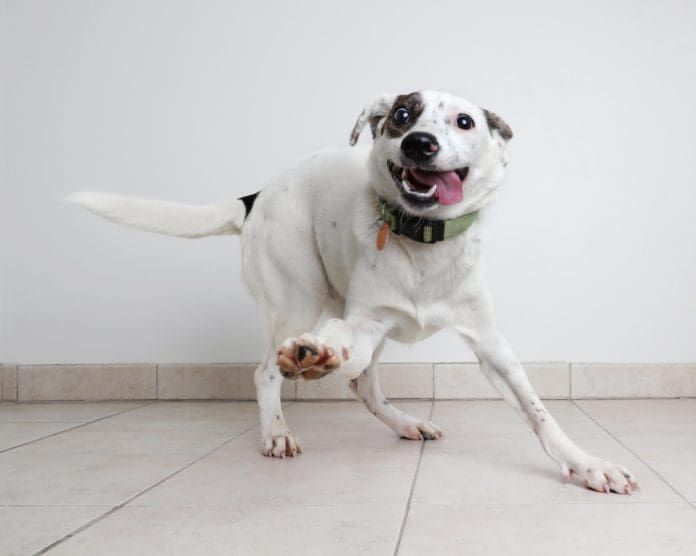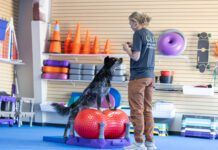On more than one occasion, people have asked me if my dog is autistic. Charlotte, a former street dog, has behavioral special needs, and I’ve lost track of how many people have asked upon meeting her, “Is she ever going to be normal?”
I like to use these moments as chances to open up conversation about neurodiversity in dogs: some experience trauma and anxiety and need behavioral management, and not all dogs process trauma the same way. My dog Charlotte has come a long way. She has psychiatric medications that help her with some of her largest triggers, daily training, and behavioral management that all work to give her an enriching, high-quality life.
Though Charlotte’s behavioral challenges are probably due to her growing up on the streets, these conversations always get me thinking, “can dogs be autistic?” The expert opinion is…maybe.
Does Autism Exist in Dogs?
Dr. Valli Parthasarathy, PhD, DVM, ACVB Resident and co-founder of Synergy Behavior Solutions in Portland, Oregon,explains that at this time autism is not a behavioral condition recognized in dogs. This is in part because there has not yet been enough research into the typical and atypical behavior in dogs for that kind of diagnosis to be given.
Dr. Parthasarathy went on to explain that in the future this may change, and there is a possibility we could see diagnoses of autism in dogs. “As we are learning more about the complexities of canine neurology, behavior and neurodiversity, the more information there is to help dogs. As we learn more, we may be able to start more finely characterizing different behavioral disorders. We may find that autism is a condition in dogs as it is in people.”
Research on Autism in Dogs
Although autism is not at this time something dogs can receive a diagnosis for, there is research being done into autism-like behaviors in dogs.
Dr. Parthasarathy explains, “According to the Mayo Clinic website, children with autism have two key characteristics: difficulty with social interactions and communication, and repetitive behaviors.”
Studies have observed comparable behavior in dogs. “For example, recently Tufts Veterinary Behaviorist Nick Dodman presented a study in which he assessed the behavior of 132 English Bull Terriers and found patterns of repetitive behavior (tail chasing), trancelike behavior, and episodic aggression similar to what can be seen in autistic children,” continues Dr. Parthasarathy.

Is Your Dog Autistic?
If you have wondered if your dog might be autistic, you aren’t alone. A variety of behavioral challenges exhibited by dogs may be interpreted by their guardians as a form of autism. Dr. Parthasarathy explains, “When my clients ask me about whether their dogs are autistic, they are often referring to dogs that are not responsive to doing what they ask, and dogs that appear to become overstimulated in new environments, are performing repetitive behaviors or may be aggressive.”
A medical condition is always a possible underlier when dogs experience severe behavioral issues like aggression or obsessive licking. Canine compulsive disorder is another possible explanation for your dog’s challenges. At one time, dogs who exhibited repetitive, compulsive habits were thought to have obsessive-compulsive disorder (OCD), but experts in the animal behavior community have since identified the condition in dogs to be distinctly separate from that found in people.
Again, autism is not yet a diagnosis that can be given to dogs. Autism-like symptoms such as repetitive behavior or episodic aggression can be very challenging for dog guardians to understand and safely manage in the home, and it may be tempting to put the autism label on a dog if it fits. But Dr. Parthasarathy explains that a detailed history of the dog is essential for professionals to come up with a diagnosis. “Many of my patients who present to me with these signs have underlying generalized anxiety that needs to be addressed,” she says.
Dogs who have anxiety disorders may exhibit symptoms that their owners interpret as autism and diagnose themselves. But in reality, “anxiety in general can affect a dog’s ability to learn, problem-solve, retain and recall information,” describes Dr. Parthasarathy.
What to Do if Your Dog Shows Signs of Autism
If you think that your dog might be autistic, or if your dog is displaying behaviors that seem to be the result of an autism-like condition, it’s a good idea to make an appointment with your primary care veterinarian. Dr. Parthasarathy explains that many conditions related to orthopedic, neurologic, gastrointestinal and dermatological issues can result in dogs being unresponsive to cues, or exhibiting trance-like, excessive sensitivity or repetitive behaviors.
If your veterinarian rules out any physical conditions, they may refer you to a veterinary behavior diplomate or resident for diagnosis and treatment. “Treatment for these behavioral conditions can be complex and may involve the use of behavioral medications as well as a comprehensive management and behavior modification plan,” explains Dr. Parthasarathy.

There are fewer than 100 behavioral diplomats or residents in the United States, so this isn’t an option available to all dog owners depending on where you live. Many canine behavior experts are able and willing to consult with primary proactive veterinarians to support individual patients, however.
Dr. Parthasarathy also advised it’s a good idea to begin working with a positive reinforcement, reward-based trainer. Find a trainer who has experience working with dogs who have behavioral concerns; a good trainer should be part of the treatment team for any dog who may be exhibiting autism-like behaviors. Correcting or punishing unwanted behaviors in dogs with severe behavioral problems can actually make the problem worse or cause other new problem behaviors to arise.
There aren’t any fast answers for working with dogs who have what might be considered autism-like behaviors. Dr. Parthasarathy cautions that, “dogs with behavioral disorders are not trying to be ‘stubborn’, ‘dominant’, or trying to ‘get away’ with things. People who live with these dogs are generally doing the best that they can. Having compassion for dogs with problem behavior, as well as their people, is an important step towards helping them.”
If you think your dog might be autistic, the most important thing is to love your dog, and commit to finding professional support to meet your dog where they are at this stage in their development. Be gentle with your dog and yourself. Just like we are getting better at accepting neurodiversity in people, I hope that as a society we will grow to understand that not all dogs experience and react to the world in the same ways.






I think my parent’s dog is autistic; he’s over a year old male terrier, neutered, and acts like a completely oblivious to his surroundings. He jumps and bites everyone constantly, bangs against the doors with his paws, eats inanimate objects and chocolate, chases his tail, and has potty issues. I don’t know how to control him when I’m around them!
OH MY GOSH!!!! you just described my dog, she is female and does EXACTLY what your parents dog do.
Thats crazy my dog is almost definite to have autism she is a neutered female and she chasing like nothing and barks at it!
If there is Autism in dogs, I suspect that our Miniature Schnauzer has it. He is very selective in how he interacts with humans. For example, hands are completely off limits. He will bite anyone who tries to touch him with a hand. He even has to be sedated for grooming. On the other hand, when we sit on the couch, he likes to be petted with the bottom of our feet. He growls at the oddest acoustic stimuli. For example, when my wife or I straighten out the sheets of our bed. He’s not on the bed at the time. There are other unusual reactions on his part, as well. He does get along well with his “big sister”, Lab mix.
I’ve rehomed a little chihuahua and she is terrified of people, including us! She comes to me for food but doesn’t want to be touched or petted, doesn’t wag her tail. See her with another dog and she’s happy and wags her tail.
I adopted a chihuahua from the city pound – same terrified with people but fine with other dogs. With a great deal of patience, he’s much better. Here’s what worked for me: Limit her exposure to noisy people, and always give her a path of escape when she’s around people. Since she’s willing to get food from you, you are probably going to be her person for the rest of her life (many, many chihuahuas have only a single person they trust). Get her a crate and teach her it’s a safe place by putting a high-value treat into it to tempt her to go into it. Once she’s used to the crate, sit next to her in the crate. Shut the door to the crate for a second or two, then open it. *Gradually* increase the amount of time the door is closed. At this point, get a comfortable harness to go around her chest, and always keep the lead on. Never reach into the crate to get her – that teaches her that your hands are going to force her to do something she doesn’t want to do. Use the lead to tug her out and a treat to lure her. Don’t stare into her eyes – a lot of dogs find that threatening – just glance off to the side a little. Patience is one of the the keys … increase the time doing things that she’s comfortable doing. Always end a training session on a high note. Praise is the other key. My dog was letting me touch him within about 3 or 4 weeks using this method. He now will come into the living room and sit next to me when I have company, even if they are strangers.
I have a Yorkshire terrier four years old I love her to bits and she’s loving in return But she will only come to you when it suits her, I have never take her off the lead because she does not do recall, and since she was a puppy she has walked round in circles if she gets stressed or excited.. she also has some potty train problems not every day she never cowers if she’s told off.. she loves other dogs and children ..you may ask what’s my problem but I would like your opinion please
After reading these comments I feel better. I have a very quirky Golden. He’s my sixth one, so I have experience with these dogs. He will chase a ball. Then, sit by it. Rarely, does he retrieve. He’s not crazy about water, paws wet is okay. He’s very fastidious, hates to be dirty. Yesterday, he was dancing around the sidewalk at the park, trying to avoid goose poo. He will sometimes act like he doesn’t hear you. I have to keep him leashed since his recall is terrible (I’ve bought books, he’s a strong case). He can be very distractable and, then, may fixate a bit. With all his quirks, he’s funny and sweet, and really amusing.
My dog dances repeatedly, to the point he looks like he’s pretending to be Kevin Bacon and doing like ballet tiptoe motions with his front paws until he starts to fall over. He’s very clumsy. Vet said he’s probably on the spectrum for autistic dogs. Even tho they don’t have the science behind it. There’s no explanation for why my dog dances until he falls down other than he just likes to do it. He also is afraid of everything. Just backs up or sits down if he gets scared. He talks constantly to all of us in the house. And strangers outside. He’s a hounddog with heterochromia so he very much is a recessive trait kinda dog. One blue eye one brown. Crazy patterns on him. He’s just touched I guess. I wish we could have him get MRI ‘S and see what’s going on upstairs. I have seizures and PTSD so I’m not neurotypical.
We have a 2 year old neutered male Arubian Cunucu, he was around 3 or 4 months when we got him. He has always been nervous acting. He knows his routine, everyday without being told he will go to his crate… when we leave for work, and when we go to bed. He seems utterly confused when the schedule changes. He doesn’t walk like a normal dog he prances…its very cute to watch. If his back is to you and you say his name… he will never turn his head to look at you, he instead will look straight back, chin pointed at the ceiling lol. He has an older adopted brother (3 year old neutered male Arubian Cunucu) who he gets along with… but doesn’t socialize well with other dogs. He only lays in the 5 same spots of the house… you will never find him laying anywhere else unless he was told… even then he will try to get to one of his spots. And before he lays down he will rub his back along something (usually the couch) then spin once then lay. He must trot back and forth at least 6 times across the yard before pooping (every time). He does not play with toys, will not play fetch. He is lazy, always laying or sleeping unless there is food around, or he is running. He loves to race his brother. Shows no emotion… he has the same two faces… ears up… or ears back lol. He either looks serious (thinks he’s getting food) or unimpressed or sad lol he will gallop about if he thinks he’s going in the car, or getting a treat. He is clumsy. We love him dearly. He keeps us laughing as to how silly he is. But we strongly feel he is autistic.
We adopted a little chocolate Pomchi in 2011. We were told that he didn’t interact with the other foster dogs, preferring to stay in a corner by himself. Fast forward to 2021 and he still prefers to be in a corner by himself.
He’s just lies about all day, never plays or shows interest in things. He doesn’t want to be held or petted. He screams if he thinks he’s about to be stepped on, and he constantly looks at the floor. He walks around the edges of a room, never across it. He doesn’t like walking on grass. He leaves the room if we talk too loud; even laughing upsets him. He’ll even leave the room if we talk on the phone. He constantly acts like we’re going to hit him though we’d never, ever do that. He’s very very obedient. He goes potty when told to immediately…doing #1 or #2 as requested! [Our neighbor says she’s jealous about that.]. We always treat this 9 pound pup, who is now 12 or 13 years old as far as we know, with love but don’t spoil him. He is my Velcro boy, needing to know where I am every minute. My concern is that his quirks are getting worse as he’s aging. My daughter has taught autistic children and she was the first to suggest that our little guy is autistic. I’ve read everything I can on autism in dogs and I believe she is correct.
Hm some of that sounds like my dog…but she is a rescue collie aussie GSD with some kind of “Spitz” and some kind of hound (per Wisdom panel dna test). She runs out of the room if I sneeze, acts like she is going to be beaten some 5 years after I adopted her (and I never laid a finger on her) refuses to walk a lot scours the rooftops for danger etc etc etc….I figured she had PTSD.
Thank you for using identity-first language surrounding autism!
My gut feeling is yes, but it would be hard to diagnose. My reasoning? If dogs can have obsessive compulsive disorder then they can have other mental challenges. I’m sure anyone that has raised a puppy has at times thought they had ADHD. Dogs can be depressed. I wouldn’t be surprised if some owners had anecdotal reports of bi-polar behavior in their dog. Dogs are prone to all sorts of genetic defects and physical abnormalities, from cleft palette to deformed legs. Why not autism? But autism reflects such a wide spectrum it would be difficult to diagnose in a dog and I imagine many years of research before it could be confirmed.
Managing Autism in dogs
You can help your dog avoid autism by identifying his triggers (what causes the atypical behavior to flare up). If your dog is aggressive and fearful when strangers approach him at the dog park then don’t take him to it.
It is better to take your dog on a walk along a quiet trail. You might also consider some techniques that have been helpful for people with special needs dogs.
Wraps are commercially available that apply a reassuring pressure on the body when triggers cannot be avoided.
Dogs can be trained to pull a wagon loaded with heavy items or carry a backpack filled with soft-weighted dog food. Many people with autism find these activities beneficial.
The Future of Canine Autism Research
The future may hold the most intriguing aspect of the question “Can dogs be autistic?” The American Humane Association and Translational Genomics Research Institute, Southwest Autism Research & Resource Center, and Tufts University Cummings School of Veterinary Medicine are collaborating in a study entitled Canines, Kids, and Autism: Decoding Obsessive Behaviours in Canines and Autism among Children.
The study will first examine obsessive-compulsive disorder in purebred dogs, including Bull Terriers, Doberman Pinschers, and Jack Russell Terriers. TGen scientists will use state-of-the-art technology to perform whole-genome sequencing on these dogs to identify genes that could be responsible for atypical behavior.
My Golden Retriever puppy (22months) exhibits many of these behaviors, chases his tail, is lethargic & sleeps a lot, stares at the ceiling, does not show emotion, not interested in other dogs, does not respond when called or acts like he doesn’t hear & the weirdest one is after his on leash walks which he loves, walks onto his yard and sits down or lies down & will not come in the house!!
my dog has mental health issues but I would not call it autism.